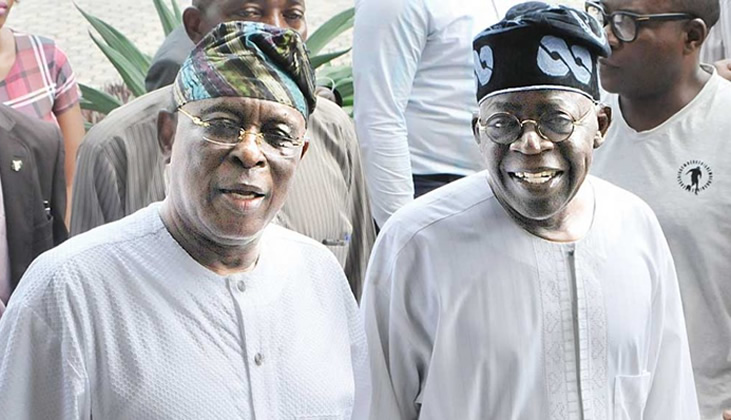Former Ogun State Governor, Chief Olusegun Osoba, has called for unity among Nigerians in support of President Bola Tinubu, emphasizing that his ascendance to the presidency was the product of a collective effort rather than an individual accomplishment. This rallying cry was made during the All Progressives Congress (APC) South West Zone Assembly held at the Eko Hotels and Suites in Lagos. During this assembly, prominent political figures from the region acknowledged their essential roles in propelling Tinubu into the national political arena, which they contend was a strategic move initiated by the South West leaders in 2007. Osoba articulated that Tinubu’s appointment to the presidency reflects a broader ambition of the Yoruba people to secure representation at the highest levels of governance.
Osoba recalled a significant gathering that took place seventeen years ago where the decision to advance Tinubu from local governance in Lagos to national politics was made. He recounted that, at a luncheon hosted by Alhaji Hamsa, regional leaders collectively resolved to support Tinubu’s elevation, recognizing their shared responsibilities toward the nation’s leadership. He stressed, “Bola didn’t make himself the President of Nigeria; we did,” underscoring the collective commitment to this political shift. This historical context highlights how local political dynamics and strategic foresight orchestrated Tinubu’s eventual rise, with leaders envisioning a stronger representation for the Yoruba people in Nigerian politics.
The assembly further delved into the historical challenges faced by the Yoruba population in their pursuit of national leadership, drawing upon past struggles exemplified by figures such as the late Chief Obafemi Awolowo and MKO Abiola. Osoba expressed sorrow over their lost opportunities and the sacrifices made by many who sought a better Nigeria. He lamented the violent episodes that marked their endeavors, stating that many who fought for reform were even killed during their quests. Nevertheless, he conveyed gratitude that some leaders from that era survived to witness Tinubu’s presidency, framing it as a triumph for the Yoruba and a moment of hope that the political aspirations of the past may finally be realized.
Though promising, Tinubu’s presidency is not free from scrutiny. Osoba acknowledged the criticisms levelled at Tinubu for economic challenges and contentious political decisions since assuming office. However, he urged the Yoruba community to remain patient and supportive, asking them to accept any perceived shortcomings in Tinubu’s leadership. He expressed confidence that Tinubu would improve and deliver on his commitments, suggesting that he deserves a sustained period in office to refine his governance. Osoba’s appeal for unity amidst criticisms aims to solidify the support for Tinubu as he navigates the complexities of his presidency.
In emphasizing the unity of the Yoruba leadership behind Tinubu, Osoba reiterated that the assembly’s stance is one of solidarity and confidence. He asserted, “The South West Assembly’s message is clear,” reinforcing their support as essential to the President’s success. The assembly perceived Tinubu’s election as a victory for progressive politics in Nigeria, reflecting a shared vision for socio-economic development. By aligning with Tinubu’s leadership, they aim to capitalize on the political groundwork laid over the years, suggesting that the foundational decisions of the past can lead to fruitful governance in the present.
As Tinubu embarks on his presidency, Osoba’s steadfast encouragement of the Yoruba to support their son in the presidency is underscored by a shared historical narrative and potential for the future. His call for acceptance of Tinubu’s challenges reflects a belief in growth and improvement over time, framing the next four years as a critical period for consolidating Yoruba representation in national governance. This framework resonates deeply within the Yoruba community, positioned between historical aspirations and contemporary political reality, aiming to foster unity and resilience during a transitional phase for Nigeria. Osoba’s reflections on the past shape a narrative of hope and collaboration, intending to guide Tinubu’s journey and forge a path toward achieving long-desired national leadership.


